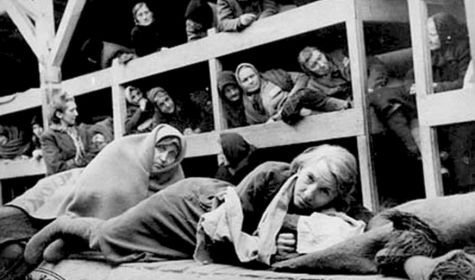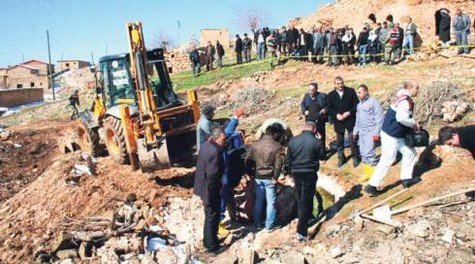Saturday People want the murderers of Seyhan Doğan, who disappeared in Dargeçit, Mardin, to be identified. (Photo: Hafıza Merkezi)
Click to read the article in Turkish / Kurdish
This article is published as part of the "In Good Times and Bad: Living Together" project of the Hafıza Merkezi Berlin (HMB) and IPS Communication Foundation / bianet. |
Sylvie Thénault is a historian who has done some very important work on the colonization of Algeria. Different forms of violence during the colonization era, the activities of the counter-insurgency organization named Organisation Armée Secrète formed to prevent Algeria's independence and in particular the tacit and open collaborations between this organization and the French residing in Algeria are among the issues that she considered. In a podcast interview, she first explains her work in detail and emphasizes how important the idea of French Algeria is for different groups like students, ex-army members, local politicians, and how strongly this idea ties them to the colonialist regime.
Algeria and the memory space of France
Next, she underlines the lasting heritage of the colonialist regime on various structures where knowledge is produced. She then shares with the audience what strikes her the most: According to Thénault, colonialism in general and colonization of Algeria in particular, is not a phenomenon convicted by the French society, nor by the French left in the broadest sense, even today.[1]
After emphasizing a number of times how striking this is for her, Thénault expresses a very basic issue. She says "I am not even mentioning the trial of the prosecutors, the removal mechanisms to be formed for reconciliation with the colonialist past, or the satisfaction of concrete demands." She adds "We are very far from making just a simple statement like 'colonialism is a bad experience involving large-scale and violent injustices' and coming to terms about convicting this experience." The memory space of France fails to make the most basic political statement when it comes to colonialism and racism.
The example of Germany
We can take comfort in saying that France is one of the worst students of Europe about reckoning with the past. Let's then move on to Germany, which is referred to as the almost 'perfect example' in this matter by some mainstream social scientists.
For the time being, let's forget that the wave of reckoning with the past significant to the foundation of new Europe after 1945 was indeed related to the anti-communism of the free world of the Cold War, to its real political concerns, and that the process called reckoning was confined and in fact designed as a new technique of governance.
The Holocaust and colonialism

Let's say Germany is a better example than France since it went through a process of 'purification from Nazis', but when we look at there today, we will come across a similar - in a sense - scenery, too. The important actors of the field of reckoning with the past in Germany have recently, once again torn to shreds the historians defending the idea of considering the Holocaust together with other genocides, colonialism, colonialist massacres, in a way reminding similar debates from the past which were carried out with different terms.
According to this conservative approach, the Holocaust was the one and only genocide because its main aim was the absolute annihilation of Jews. For this reason, it could not be compared to other genocides with limited and pragmatic aims. The next sentence of these conservative historians is that anti-zionism is anti-semitism.[2] In Germany that is the kaaba of the framework of reckoning with the past, there is a very strong reaction against thinking of the Holocaust together with the other colonialist and racist forms of violence of the 20th century. Apparently, things are not that bright with the example thought to be the best either.
The discourse of neofascist movements in Europe
Saying "Türkiye has to reckon with the past because Europe did this" as in early 2000s, underlining Europe's insistence on this matter as a normative example is even more difficult today. Europe itself seems quite fragmented; affected also by the rising neofascist movements, let alone the demands for reckoning with the past, it has partially renewed itself with weary denialism, in different forms with the old and new generations.
Rising neofascist movements have a number of trademarks. These can be summarized as hostility to LGBTQI+ movements and reproduction of the sacred family myth, hostility to the refugees/foreigners, opposition to abortion and objection to bodily integrity, particularly to transgender rights, and an enormous attack against all the achievements of the working class despite the apparent 'end to the hegemony of finance capital' uproar.
Besides, we can define one of the most important political axes of these neofascist movements as a framework of 'being proud of the past' that can be summarized with nostalgia for colonialism, apology for the Holocaust and genocide, denialism and a heroic nationalism through taking the blame for state crimes and a tribute to militarism.
France and Poland
Here is an example from France. Eric Zemmour, a spokesperson, who can be viewed as a representative of the jester type, of the French classical fascism produced many racist, colonialist, and nationalist myths about different phases of the French history, from the colonization of Algeria to the collaboration with Nazis during the Second World War. We can formulate one of the most important legs of his presidential election campaign as a 'call to the genuine French who are not ashamed of their past'. While Zemmour's election campaign continued, several historians with different views came together and published a pamphlet titled Zemmour Against History. The reason for the publication of the pamphlet was stated as a call of duty against the distortions by Zemmour.[3]
Another example is from Poland. One of the most important political areas of the extreme-right and neofascist movements of Poland, which assert that Poland's role in the Holocaust was exagerated, is the issue of the past with which they deal by denying the Holocaust and highlighting the historical revisionist theses.[4]
Working through the past
In short, the memory, the past, and in Adorno's words "working through the past" has become one of the main issues of numerous fascist movements' politics today. Whether we care or not, whatever we call it, the memory space, or more generally ways of considering the past under different political perspectives is currently targeted by neofascist movements, all sorts of right, and conservatism around the world.
This is not the only problem though. Because even though different fascisms grow stronger and struggle to seize the discussion on the past and the memory, the radical and revolutionist group introduces the ghosts of the past to today's independence struggles by establishing the continuity of the past and the present. A great deal of radical and fundamentalist anti-colonialist movements from the United States of America to England, from France to Greece, raise their voice on the streets, some by tearing down[5] the statues of colonialists, some by rebelling against the violence of the police in the suburbs where they are confined to the periphery of the city. The most important differences of these movements from their relatively milder counterparts from several decades ago is that they do politics by relating the ghosts of the past to the current relations of exploitation and dominance, to the guards of those relations.
To put it differently, this new generation of anti-racist and anti-colonialist grassroots movements reconsiders the past by relating it to the conditions of the modern racist capitalism that they currently live in, by relating the past to the present instead of viewing it as a chronology of faits accomplis. Hence, working through the past is not only in various fascisms' power, but it is being rebuilt everyday as a form of struggle in the power of different independence and freedom movements too.
Türkiye and the memory return
When we look at Türkiye, it seems to me that we are in certain paradoxes about working through the past. First let me say that I do not agree with the common premise that Türkiye is a country of forgetting/amnesia. The consideration of the past, of the period of the Ottoman Empire and the Republic has an important place in the ways both radical political movements and mainstream political traditions of Türkiye form themselves. Moreover, in Türkiye, we can talk of a memory return whose origins can be traced back to the 1990s, but which were developed especially starting in early 2000s, and paved the way for the formation of a new memory space that demands new types of relations with the past and maybe a memory justice. [6]
This space consisting of studies in arts, activities of new-generation non-governmental organizations and several critical academic studies interacts with the political mobilization of several movements that do politics about working through the past in Türkiye.
Despite the important accumulation it created, I believe that we have to take a critical look at it, since I think that this field generally remained too distant from the views based on racism and colonialism, that it looked at the ways of reckoning with the past only from the axis of individual rights and freedoms rather than from a framework of collective struggles, and that it set a language discussing the crimes of the past through diminutive, attenuating and loose terms.
To me, the struggle for reckoning with the past in Türkiye is not an issue to be discussed by truth technicians that have a certain level of knowledge, this struggle is a field that should be considered politically and its basic terms should be generated by taking the demands of numerous political movements into account.
Reconciliation and its criticisms
This field was recently marked by CHP leader Kemal Kılıçdaroğlu's proposal of 'reconciliation'. This is very understandable as it is obvious that the fascistic position of the government with increasing nationalist tendencies will keep adding new ones to the crimes of the past rather than reckoning with the past. Hence, the reconciliation proposal has rightfully turned into a matter of debate. Yet there are two things that seem weird to me. First, people were very much bothered with the word in the reconciliation proposal unlike the discussion around the recognition of the Armenian Genocide where it was argued that 'words do not matter, the important is to tell the problem' despite the significance of the terminology. The discussion whether it is reconciling, confronting, or reckoning appeared in a lot of platforms including social media. I am among those who think that the word does not make too much of a difference in this context. Suggesting alternative notions to refer to the processes of reckoning with the past in a more local terminology is neither a very novel nor a very original invention.
The second point that I would like to draw attention to is that while the bitter debate about the notion is going on, the debate on the political content suggested by the notion remains quite weak. How the process of reckoning with the past will go is more of a political problem before everything else, it is related to today and to the present as much as, maybe even more than it is related to the past; it is related to today's perspective of living together politically.
"The struggle for reckoning with the past is not unclaimed"
I want to underline it once again, I do not find it correct to depoliticize the processes of reckoning with the past by framing them as processes that require mere expert knowledge. Of course, it will be important and appropriate if some actors that have a certain level of knowledge facilitate the process. However, this is not the core of the issue of reckoning with the past in Türkiye, this is not the critical point. In the struggle for reckoning with the past in Türkiye, there are political movements with a political perspective to relate the process to today and with current demands in addition to very valuable actors like Cumartesi Anneleri/İnsanları (Saturday Mothers/People), Barış Anneleri (The Peace Mothers), and various rights organizations with very concrete justice demands.
I believe that the issue is how to think of and to frame all these demands together. Here too, I believe that if the actors of Türkiye' memory-space demand as much as possible, this will yield more positive results. Despite the hazy fascism we live in, the struggle for reckoning with the past in Türkiye is not unclaimed, it has a strong political accumulation. We have to force all the cliques speaking from within the state by relying on this political accumulation to do more and to speak more concretely.
The case of Mardin Dargeçit
In Mardin Dargeçit, on October 30, 1995, seven people including three children were taken into custody with the claim that they helped the PKK. Noone heard from them after the peasants Süleyman Seyhan (57), Abdurrahman Olcay (20), Mehmet Emin Aslan (19), Abdurrahman Coşkun (21), Davut Altunkaynak (13), Nedim Akyön (16), and Seyhan Doğan (14) were taken to Dargeçit District Gendarmerie. The families who for years relied on the legal system for their relatives to be found filed again in 2009 and the case was reopened.

In the investigation, it was eventually determined that the seven peasants were killed through torture, based on the statement of the victims' relatives and the secret witnesses including the forest keeper, teachers as well as soldiers. The body of Seyhan Doğan who went missing in Dargeçit when he was 13 years old is found in the mass grave that was opened 18 years later. While the first indictment asked for their aggravated life imprisonment, the accused Mardin Gendarmerie Commando Battalion Commander Hurşit İmren, Dargeçit District Gendarmerie Commander Mehmet Tire, Dargeçit Center Gendarmerie Patrol Commander Mahmut Yılmaz, Patrol Deputy Commander Haydar Topçam, and Specialized Sergeant Kerim Şahin were all acquitted in the final hearing on July 4, 2022. A while ago, before the trials ended, Hazni Doğan, who struggled all his life for justice to prevail in Dargeçit JİTEM (Gendarmerie Intelligence and Counter-Terrorism Organization) case and for murderers of his brother Seyhan Doğan to get the punishment they deserve, tells about the hearings and the process of trials as follows:
'There are currently courts, but these courts allow people who kill 12 year old children to walk easily among the public instead of reaching a verdict. These people are not even jailed pending trial. Unfortunately, the court makes us suffer further. We keep going to the court. Not even one of the accused people comes to the court. And at this moment, we are indeed seriously concerned because this last judicial process started in 2015 and there are three more years. It is already heading towards statute of limitation.
The court boards that should have reached a verdict in the last five sessions did not reach a verdict, the previous board had even stated that they would reach a verdict for sure. And the board, the board changed. We are seriously concerned that the case of Dargeçit is dragged to statute of limitation.
Anyway those who did this are resting at ease. Even a lawyer stood up at the court and officially confessed. He said 'Your Honor, these people are the state's sergeant, lieutenant, battalion commander, who are you judging, who are you interrogating?'." [8]
Those thinking of carrying out any kind of a process to reconcile, to reckon, to confront should start by saying concrete things to Hazni Doğan. Whatever it is named, a process worthy of the name can take place only then.
In Good Times and Bad: Living Together Article Series
1- Family: In good times and bad...
2- Is it possible to live together in the presence of impunity?
3- Politics of horror and the cinema
4- What can hatred be washed off with?
5- Creativity and music: In good times and bad
6- "We know that we are definitely unwanted people"
[1] Sylvie Thénault, Spectre, Minuit dans le siècle, L'OAS, Le racisme coloniale et l'extrême droite https://open.spotify.com/episode/0JbLMQEXok5Wp5tT5qVw0C
[2] A. Dirk Moses, The German Catechism, https://geschichtedergegenwart.ch/the-german-catechism/
[3] Zemmour contre l'histoire (Paris: Collection Tracts no 34, Gallimard, 2022)
[4] Jan Grabowski, The New Way of Holocaust Revisionism, New York Times, January 29, 2022, https://www.nytimes.com/2022/01/29/opinion/holocaust-poland-europe.html
[5] For a comprehensive discussion on the historical roots and the political meanings of tearing down the statues, see Enzo Traverso, Tearing Down Statues Doesn't Erase History, It Makes Us See It More Clearly, Jacobin, April 2020, https://jacobin.com/2020/06/statues-removal-antiracism-columbus
[6] For a review of the use of the term 'memory return' and especially the artistic production of this critical field that came into being since the beginning of 2000s, see Devrim Sezer, Emre Gönlügür, Wearing Out The Dominant Narratives: Public and artistic interventions to the memory landscape, Birikim, 392, December 2021, 10 – 24.
[7] The word "helalleşme" used by Kılıçdaroğlu is derived from the Arabic root "halal" meaning permissible in Islam. It means forgiving each other for past hurts or wrongdoings, making amends, giving blessings. TN
[8] Hazni Doğan, I Am In Fact His Younger Brother, But Seyhan Remained 13 Year Old, Bianet, Respect for the Dead and Justice Panels VIII, September 18, 2022, https://bianet.org/bianet/yasam/267210-aslinda-kardesiyim-ama-seyhan-13-yasinda-kaldi
About the projectThe podcast and article series "In Good Times and Bad: Living Together" are prepared as part of a project run by the Hafıza Merkezi Berlin (HMB) and IPS Communication Foundation / bianet. The coordinators of the project are Özlem Kaya from the HMB and Öznur Subaşı from the IPS Communication Foundation. The project advisor is Özgür Sevgi Göral and the project editor is Müge Karahan. With a focus on "living together", the series will address the themes of family, punishment, fear, hate, creativity, racism, memory, lie, anthropocene and friendship. The episodes will be published every 15 days on Tuesday. |
(ÖSG/SO/NÖ/VK)





